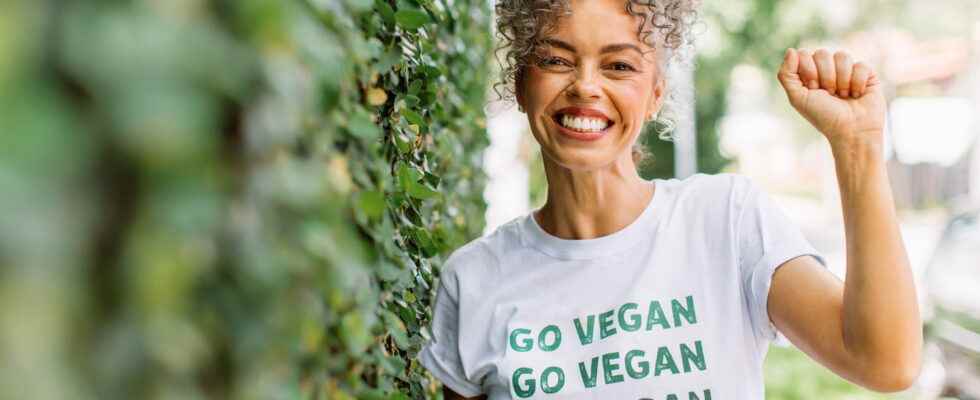By excluding all products of animal origin, veganism (or veganism) exposes you to many nutritional deficiencies. What to eat to start? What precautions should be taken to eat healthy?
What is the vegan diet?
The vegan diet is a food practice who excludes all animal products : meat, fish, shellfish, eggs, but also dairy products and honey. When this principle applies to all everyday objects (cosmetics, clothing, etc.), it is no longer a question of a simple diet but ofa true way of life : veganism.
What to eat to start?
The entry into veganism must be done gently. Before totally eliminating animal products, it is best to start with adopt a vegetarian diet, that is, to stop eating meat, fish and shellfish. “One can, for example, replace them with tofu or seitan. It is important to give pride of place to cereals and legumes, while increasing your consumption of fruits and vegetables. The latter must be raw, preferably, to obtain better vitamin C intake and allow better assimilation of iron in the body“, advises Maxime Messegué. To compensate for the lack of calcium due to the avoidance of dairy products, it is recommended to increase your consumption of dried fruits (almonds, walnuts, figs, dates and dried apricots) and to favor drinks based on rice and soy. There are many vegan products in organic stores and on the internet.
While it is relatively easy to do without meat and fish, dairy products and eggs fit into many culinary preparations. Fortunately, there are many plant-based alternatives. For example, to replace eggs in cakes, it is possible to use cornstarch or compote. The vegetable drinks such as almond milk, oat milk, rice milk or coconut milk, can replace milk, provided they are fortified with calcium. The fresh cream can be replaced by soy cream, rice cream or coconut cream. Finally, if the taste of butter is irreplaceable, it can nevertheless be replaced by oilseed puree (almond, cashew nuts).
To avoid deficiencies, it is essential to opt for a varied and balanced diet. We focus on cereals, legumes, vegetable oils rich in omega 3 fatty acids (flax, walnuts, hemp). “To make up for the iodine deficit linked to the elimination of fish, some algae will do. As for iron, it is found in spinach, soybeans, lentils, white beans, almonds, walnuts, hazelnutssunflower seeds, broccoli, dates and olives“, specifies the dietician-nutritionist. To cover its calcium needs, one can consume oilseeds but also green vegetables.
What precautions to take?
Before embarking on a vegan diet, it is recommended to take stock with a nutritionist or a general practitioner to detect any deficiencies that could put your health at risk. “It goes without saying that veganism is formally not recommended for pregnant women, children, adolescents and people with chronic illnesses. And this, because it exposes to many deficiencies difficult to fill“, indicates the expert.
When to take food supplements?
A vitamin B12 supplementationpresent in meat and fish, is essential for the formation of red blood cells and the proper functioning of the immune system.
The vegan diet can also lead to iron, iodine, zinc, calcium, and vitamin A and D deficiencies, essential for the proper functioning of the body. “Hence the need to be followed because it is not because you feel good the first few months that you do not have a deficiency. These usually begin to show up after two years. The general practitioner may see fit to prescribe a blood test to monitor your vitamin and mineral intake.insists the dietitian-nutritionist.
Thanks to Maxime Mességué, dietitian nutritionist in Paris
